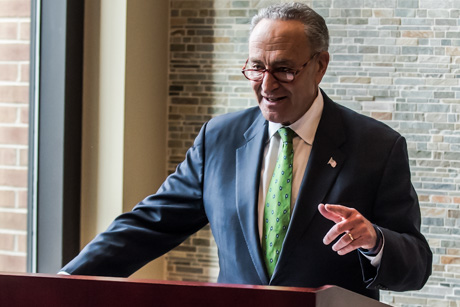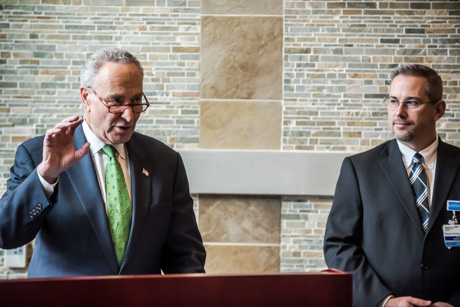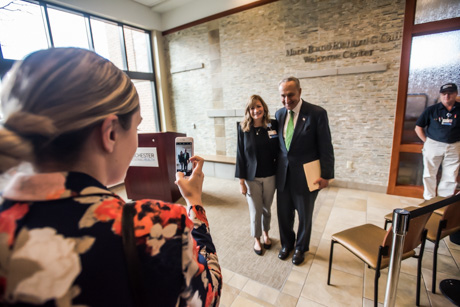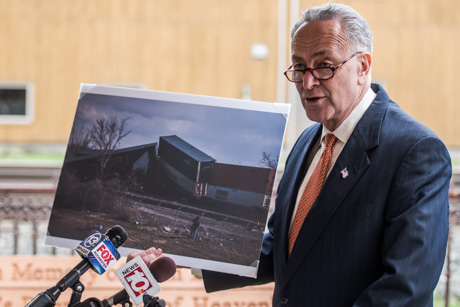Senators Charles Schumer and Kirsten Gillibrand also put out a joint statement in support of the budget bill:
U.S. Senate Minority Leader Charles E. Schumer and U.S. Senator Kirsten Gillibrand today announced major victories that will greatly help Upstate New York in the bipartisan federal funding bill. The senators said these victories will boost the economy and support vital programs, including funding for the opioid prevention, Great Lake Restoration Initiative (GLRI), funding HOME/CDBG Program, critical railroad safety programs, support for education and higher-education and much more. Schumer and Gillibrand provided statements for several major areas in which the budget will be a major boost for Upstate New Yorkers.
The bill includes the following victories for Upstate New York:
Opioid & Prescription Drug Prevention & Treatment Programs
“For too long, heroin and opioid use, fatal overdoses, and drug-related crimes have been on the rise, plaguing Upstate New York communities,” said Senator Schumer. “New York deserves every federal resource possible to combat the growing scourge of opioid drug abuse and trafficking – and to increase treatment and prevention. That is why I went to bat for New York and pushed my colleagues to include this vital funding to combat the opioid epidemic in the final federal funding bill. The federal government must continue to invest in new and innovative ways to combat heroin and opioid use and tackle this challenge head-on.”
“Too many lives have been destroyed, too many families have been torn apart, and too many communities all over New York are suffering because of the opioid epidemic,” said Senator Gillibrand. “This is a public health crisis, and our communities need more funding and resources to combat and help address substance abuse. I’m pleased to see that following our push, the omnibus bill includes a strong investment for states and community organizations across New York to expand prevention, treatment and monitoring programs.”
Specifically, the agreement provides a $3.3 billion increase over last year’s funding levels for efforts throughout government departments and agencies to combat the opioids and mental health crises, including more than $2.8 billion in increases for treatment, prevention, and research for programs within the Department of Health and Human Services. The Substance Abuse and Mental Health Services Administration will get a $1.4 billion increase over last year; SAMHSA leads our nation’s treatment efforts to address the opioid and heroin crisis gripping communities throughout New York and the rest of the nation. In each of the last two fiscal years, New York received more than $111 million from SAMHSA block grants.
Additionally, the agreement funds nearly a $2 billion increase over last year’s levels for programs beyond SAMHSA in efforts through several departments and agencies specifically targeted to attack the opioid/heroin crisis.
· $300 million more for Department of Justice initiatives including interdiction, enforcement, drug and mental health courts, and treatment programs;
· $350 million more for the Centers for Disease Control for preventing prescription drug overdoses;
· $500 million more in NIH funding for targeted research on opioid addiction within the National Institute of Neurological Disorders and Stroke (NINDS) and the National Institute on Drug Abuse (NIDA);
· $415 million more to the Health Resources & Services Administration, which promotes health care in underserved communities and oversees Community Health Centers. There are 65 CHCs in New York, serving nearly 2 million patients in 2015 and employing more than 15,000 New Yorkers; and
· $61 million more to the Department of Veterans Affairs for additional funding for treatment and prevention ($434.6 million total).
High-Intensity Drug Trafficking Area (HIDTA)
“For too long, heroin use, fatal overdoses, and drug-related crimes have been on the rise, plaguing Upstate New York communities. This is why I rejected the administration’s initial request to gut the Office of National Drug Control, including HIDTA, and robustly fund the program. Now communities in New York State and beyond will have the federal resources they need to combat the growing scourge of drug trafficking. I went to bat for the High Intensity Drug Trafficking Area (HIDTA), program and now with $280 million in federal funding an increase of $26 million from FY17, communities in New York will finally have the funding needed for increased technical expertise, more law enforcement personnel and the additional resources needed to combat heroin use and tackle this challenge head-on,” said Senator Schumer.
“I’m very pleased to announce this new federal funding to help communities in Upstate New York fight the opioid epidemic,” said Senator Gillibrand. “The opioid epidemic has already torn apart too many families and destroyed too many lives in New York, and we must use every tool and resource we have to end this crisis. This funding will help ensure that law enforcement agencies at the federal, state, and local level are able to better coordinate with one another to safeguard our communities from drug trafficking and abuse. I was proud to fight to make sure these funds were included in the omnibus, and I won’t stop working with my colleagues until the opioid epidemic is ultimately defeated.”
INTERDICT ACT Funding – CBP Fentanyl Detection Devices
“Deadly substances are being smuggled into our communities sold on our streets, and are destroying our families. We know how they get here and where they come from, which is why I worked to pass INTERDICT into law so that narcotics, like illicit fentanyl, entering ports of entry and international mail facilities can be quickly detected, identified and seized. With the $65 million in federal funding provided by this agreement, a nearly $60 million increase than what was originally authorized, customs agents at airports and beyond will finally have the resources they need to stop this flood and help save lives. With this new multimillion dollar investment those of the front lines will have the hi-tech tools necessary to root out fentanyl and other synthetic opioids that are leading to tragic deaths throughout New York,” said Senator Schumer.
“Too many communities across New York are suffering because of the opioid epidemic. As we continue to combat this crisis, we need to ensure that law enforcement personnel have the necessary resources to keep our communities safe,” saidSenator Gillibrand. “This critical funding will help our law enforcement control illegal imports and prevent the spread of illicit fentanyl throughout the state. I was proud to be a co-sponsor of the bipartisan INTERDICT Act, and am pleased that funding will be allotted to target one of the root sources of the opioid addiction crisis.”
HOME Investment Partnerships Program (HOME)/ Community Development Block Grant (CDBG) Program
“CDBG funding is the very cornerstone of Upstate economic development efforts and community revitalization, so it was critical that we fought and won to provide substantial resources via this vital program all across Upstate New York. Investing in strong neighborhoods is an important victory to help economic development efforts in Upstate neighborhoods by providing homeownership, rental assistance, and housing rehabilitation funds. We were able to secure $1.36 billion for HOME Investment Partnerships (HOME) funding and $3.3 billion for Community Development Block Grant (CDBG) funding. Without this critical funding, already vulnerable communities could have been devastated,” said Senator Schumer. “That is why I fought with every fiber of my body to prevent the proposed elimination of both the HOME and CDBG programs. This funding means local governments and communities will now have the resources they need to provide families and their children with safe and affordable housing options and can continue the neighborhood revitalization efforts that are critical to local economic development.”
“I’m very pleased to announce this funding for the HOME Investment Partnerships Program and the Community Development Block Grant Program,” said Senator Gillibrand. “These programs help support economic development in rural and urban communities all over our state and helps ensure that low-income New Yorkers and their families can have a place to live no matter where they are from or what their life circumstances are. I was proud to fight for inclusion of this important federal investment in the omnibus, and I will continue to do everything I can in the Senate to support these programs.”
Great Lake Restoration Initiative (GLRI) Funding
“It is imperative that we continue to properly monitor, preserve and rehabilitate our Great Lakes – which are sources of drinking water, recreation, and jobs-- so residents and visitors can enjoy these invaluable Upstate NY resources for years to come,” said Senator Schumer. “We need to continue to protect New York’s most vital water resources – like Lake Ontario and Lake I will continue to fight year after year to secure the highest level of funding for the GLRI program. I am optimistic that this federal investment will allow for more fishing and tourism opportunities, which means new jobs and new revenue.”
“I am very pleased to announce new federal funding for the Great Lakes Restoration Initiative,” said Senator Gillibrand, a member of the Senate Environment and Public Works Committee. “The Great Lakes are some of New York’s most treasured resources, and this important program helps ensure that we can continue to restore and preserve the Great Lakes watershed for years to come. I will always fight in the Senate to protect our Great Lakes, and I was proud to fight to make sure this funding was included in the omnibus bill.”
Railroad Safety Including Positive Train Control (PTC)
“Positive Train Control will help prevent fatal crashes and derailments – and so it’s of the utmost importance that all of our rail lines have this life-saving technology installed as soon as possible. That is why I fought so hard to secure $250 million to help pay the cost of PTC implementation in cases where governments and taxpayers would have to bear the brunt of the expense,” said Senator Schumer. “We need to install cutting-edge technology that will save lives before we see more tragic derailments like the Philadelphia tragedy.”
“There is an urgent need to improve the safety of our railways and this federal funding will help implement Positive Train Control, grade crossing improvements, and other critical railway safety updates,” said Senator Gillibrand. “I was proud to have fought for these funds to be included in the omnibus language. We should continue to make these major investments in our rail infrastructure to ensure that New York State commuters and the communities around the tracks are safe and have access to the most efficient railways.”
Rebuilding Crumbling Veteran’s Hospitals
“Our vets need and deserve better healthcare in state-of-the-art facilities. This new bill will give the VA hospitals in New York and beyond the ability to repair, modernize and maintain their infrastructure. These brave men and women fought to protect our freedom and it is our duty to protect them by providing access to high-quality health care services in modern hospitals,” said Senator Schumer.
“Our veterans risk their lives for this country, and they should be guaranteed the best care and the best treatment when they come home,” said Senator Gillibrand. “These federal funds will help rebuild New York’s veterans hospitals, so that any veteran who needs to use one will be able to receive the highest level of care. I was proud to fight for this funding, and I will always do everything I can in the Senate to protect our veterans.”
Clean Water and Drinking Water State Revolving Fund
“This bill contains an important victory for updating New York’s aging water infrastructure and job creation: we secured $1.694 billion for the Clean Water State Revolving Fund and $1.163 billion for the Drinking Water State Revolving Fund. This represents a $600 million increase in our water infrastructure. This federal funding will provide critical support to water and sewer projects across the state many of which are long overdue. New York has some of the oldest sewer systems in the country, and the State Revolving Funds can be used to upgrade and modernize water infrastructure,” said Senator Schumer. “In any given year, we have hundreds of sewer and water system projects in Upstate New York that are in need of funding, so I was proud to go to bat for this program to ensure that funding for New York was not scrapped or put on the back burner. Now I’m urging my colleagues on both sides of the aisle, and in both chambers of Congress, to vote for this bill so we can send this to the president’s desk. Having safe and up to date water and sewer systems is critical to public health and helping New York towns and villages grow and prosper.”
“New Yorkers know all too well that clean water is something we can never take for granted, so I am very pleased to announce this new funding for the Clean Water and Drinking Water State Revolving Funds,” said Senator Gillibrand, a member of the Senate Environment and Public Works Committee. “These federal funds will help make sure communities in New York have the resources they need to keep their drinking water clean and safe, and to keep their wastewater systems working well. I was proud to fight for these funds, because no New Yorker should ever have to worry about whether our water is safe to use.”
Firefighter Assistance Grants
“It is critical that we continue to invest in our fire departments and brave firefighters. This bipartisan bill includes an important victory to pay for more fire equipment and hire and retain more firefighters. We were able to secure $700 million for our brave firefighters, who risk their lives every day to protect our communities, and who deserve to have the state-of-the-art equipment needed to do their jobs safely and effectively,” said Senator Schumer. “We need to continue to increase funding for these two critical programs that deliver vital resources to our fire departments across Upstate New York. I’ve fought my whole career to bring more federal resources to our volunteer and career fire departments – that is exactly why I worked double-time to keep our firefighters and communities safe this year.”
“This funding for the Firefighter Assistance Grants will help ensure that fire departments across New York have the training, equipment, and staffing they need to serve their communities safely and efficiently,” said Senator Gillibrand. “Firefighters risk their lives to keep us safe, and I will always support programs that provide them with the necessary resources they need to keep them and our communities safe.”
Infrastructure Programs like the TIGER Grant Program
“This bipartisan bill contains a major victory for communities across Upstate New York now pursuing economy-boosting transportation and infrastructure projects. The bill reverses the administration’s proposed cut and not only fully funds the TIGER Grant Program, but also secured a $1 billion increase, bringing the total funding to $1.5 billion. This is vital funding that is so critical to transportation improvement projects across Upstate. Everything from returning cars to Main St. in downtown Buffalo, to the transformation of Rochester’s Inner Loop, to improvements to the Capital District and Hudson Valley bus services have been funded by TIGER grants in the last few years,” said Senator Schumer.
“I’m very pleased that our federal infrastructure programs, including the TIGER Grant Program, will continue to receive an increase in funding from Congress despite the Trump Administration’s attempts to cut them,” said Senator Gillibrand. “These programs help ensure that when communities in New York are confronted with the need to improve their aging and outdated highways, bridges, railways, and multimodal facilities, there are federal resources to help them do the job. I was proud to fight for this funding, and I will continue to support these essential infrastructure programs in the Senate.”
Consolidated Rail Infrastructure and Safety Improvement Grants (CRISI)
“Rail infrastructure across New York State and the entire country will get a much-needed boost as a result of this agreement. Over $590 million was included in the CRISI program which will help support rail infrastructure and safety projects across the country. These grants go to projects aimed at advancing the safety and dependency of our railways and will work to improve rail safety, grade crossing safety, and to install Positive Train Control,” said Senator Schumer.
“Millions of New Yorkers rely on our railways for daily transportation, long-distance travel, and freight service to deliver New York goods across the country,” said Senator Gillibrand. “This federal funding for the Consolidated Rail Infrastructure and Safety Improvement grant program will help increase the safety, efficiency, and reliability of our rail systems, and I’m pleased that this year’s spending package will include this important investment for rail infrastructure.”
Airport Improvement Program (AIP)
“Making sure New York’s airports are clear for takeoff is essential for the safety of air travelers and smooth functioning of the state’s economy – and especially to our upstate cities and small communities. This new $4.35 billion in federal investment will fully fund the Airport Improvement Program (AIP) and is a major win for New York State and its visitors. The bill adds $1 billion to the program which grants money to critical projects to improve many aspects of the airport including security, capacity, and environmental concerns. These funds are a win for New York’s airports and the millions of residents, tourists and business people who use them each year,” said Senator Schumer.
“These federal funds will help ensure that the Airport Improvement Program can continue to help communities all around New York improve their local airports,” said Senator Gillibrand. “Many communities in our state rely on their airports to support the local economy, and they often need resources from the Airport Improvement Program in order to complete important projects like runway construction, runway lighting, and airport safety improvements. I was proud to support this program in the Senate, and I’m very pleased that these funds were included in the omnibus.”
High-Speed Internet
"To create the vibrant Upstate New York economy of tomorrow that creates and sustains the jobs of the future, we must invest in high-speed internet networks today, so that every Upstate home, school or small businesses gets – and stays – connected. The difference between economic success and failure in the 21st Century will be in large part determined by equal access to high-speed broadband that is reliable and affordable. With this multimillion-dollar investment, rural communities across New York state will finally have the resources needed to close the digital divide. These investments will create jobs, expand minds and build a strong base for future economic growth in New York state and beyond,” said Senator Schumer.
“There is no doubt anymore that our schools, hospitals, and businesses must have access to high-speed broadband internet in order to thrive. Imagine not having access to power or a road; that’s how we should be thinking about high-speed internet access in the year 2018,” said Senator Gillibrand. “I am very proud to announce that the omnibus bill includes substantial new federal funding that will help bring high-speed internet to rural communities all over New York. This is outstanding news for our state, and I will continue to fight in the Senate to make sure New Yorkers have every opportunity to succeed.”
Low Income Home Energy Assistance Program (LIHEAP)
“Hundreds of thousands of fixed-income seniors and low-to moderate-income New Yorkers each year rely on LIHEAP funding to help pay for the home heating costs that have become a larger and larger share of their budget. This major federal investment –of more than $3.64 billion in federal funding – will help New York’s most vulnerable cover their high energy costs. This means fewer people will have to make the agonizing decision over whether to pay energy bills or put food on the table,” said Senator Schumer. “Having these funds available for New Yorkers who deal with harsh winters is critical.”
“LIHEAP is a lifeline for over one million New Yorkers, including many seniors living on a fixed income, veterans, and low-income families who struggle to pay their heating bills in the winter,” said Senator Gillibrand. “No New Yorker should have to choose between staying warm in the frigid cold and paying rent or putting food on their table, and I’m proud to have fought for these critical home energy assistance funds in the omnibus.”
Head Start Program
“Head Start is an investment that pays massive dividends later in life. New York has one of the largest enrollments of children in the Head Start program and this funding will allow New Yorkers to better address the needs of children and make sure that they have the opportunity to fulfill the American dream,” said Senator Schumer.
“Head Start helps ensure some of our youngest students in New York and across the country start out strong and have the resources they need to learn, grow, and succeed inside and outside the classroom later in life,” said Senator Gillibrand. “We know from studies that Head Start provides one of the most significant returns on our federal investment, and we have to keep fighting to make high-quality early childhood education a priority. I was proud to advocate for this funding, and am pleased to see it included in the omnibus."
Child Care and Development Block Grant (CCDBG)
“High-quality child care is essential to enable parents to get and keep a job and to give children a strong start toward success in school and life. Unfortunately, it is out of reach for many families, but now with this additional $2.37 billion of funding increases – bringing the total funding to $5.23 billion – we will add tens of thousands of new slots for working families who need access to affordable child care,” said Senator Schumer.
“I am proud to have pushed to secure funding for the Child Care and Development Block Grant Program so that New York State and states across the country have the resources they need to ensure vulnerable children have access to the early learning experiences they need to succeed both inside and outside of the classroom,” said Senator Gillibrand. “These funds included in the Omnibus legislation are an investment in our communities and will help millions of low-income children and thousands of families in New York and across the country thrive.”
Stream gauge Funding
“Stream gauges are a critical first line of defense against impending floods, and given the repeated storms and flooding we have seen across New York, I made boosting their funding a top priority over the last year. Upstate New York communities also will be better served in flood detection, prevention, and evacuation planning as the U.S. Geological Survey’s (USGS) Groundwater and Streamflow Information Program received a $1.5 million funding increase specifically for stream gauges. Now, I will push to see those funds flow to New York, where USGS can work to keep ever-threatened gauges online, and potentially add more of these flood detection devices to high-risk flood zones in order to better prepare for the next natural disaster,” said Senator Schumer.
KEG
“I’m very pleased to announce these new federal funds for the stream gauge program to help communities protect themselves against flooding from rivers and streams,” said Senator Gillibrand, a member of the Senate Environment and Public Works Committee. “Communities across New York are at risk from flooding, whether it is seasonal or from heavy storms, so it’s essential that we continue these important flood prevention efforts around the state. I was proud to fight for this funding, and I will continue to do everything I can in the Senate to make sure New Yorkers are protected from floods.”
National Institute Of Health (NIH)
“This federal funding bill provides $37.1 billion for the National Institutes of Health, the epicenter of cutting-edge medical research, an increase of $3 billion over last year’s level and $2.4 billion more than the administration proposed in their budget. This money is so critical to New York State; last year, New York received more than $2.3 billion in NIH awards, supporting 30,000 jobs and research institutions from Cornell to Rochester to SUNY-Buffalo and elsewhere throughout Upstate New York. I will continue to fight for this critical funding to support Upstate New York State’s world-class research institutions and universities,” said Senator Schumer.
“The National Institutes of Health is one of the world’s leading medical research institutions, and this federal funding is a critical investment that ensures continued support for the NIH’s work to discover innovative treatment methods and cures for countless diseases,” said Senator Gillibrand. “The scientific advances made at NIH research centers are vital to the future of health care, and I am proud to have fought for this funding to be included in the Fiscal Year 2018 spending bill.”





